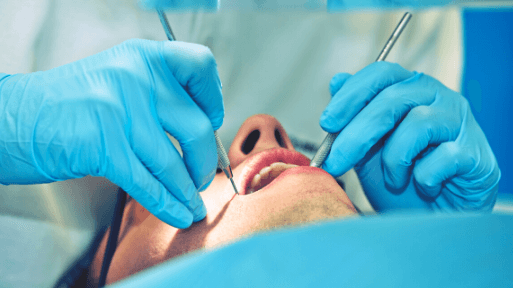Nutrition and Your Teeth
 When it comes to maintaining a radiant smile and ensuring the health of your teeth, what you eat plays a pivotal role. Beyond brushing, flossing, and regular dental check-ups, incorporating a nutritious diet is fundamental. This blog post explores how certain foods can benefit or harm your dental health.
When it comes to maintaining a radiant smile and ensuring the health of your teeth, what you eat plays a pivotal role. Beyond brushing, flossing, and regular dental check-ups, incorporating a nutritious diet is fundamental. This blog post explores how certain foods can benefit or harm your dental health.
Foods That Promote Dental Health
- Dairy Products: Cheese, milk, and yogurt are not just rich in calcium; they also contain casein, a protein that helps strengthen tooth enamel. The calcium and phosphates in dairy help replenish minerals your teeth might have lost due to other foods.
- Crunchy Fruits and Vegetables: Apples, carrots, and celery are not only nutritious but also act as natural toothbrushes. Chewing them produces saliva, which helps wash away food particles and bacteria, and their fibrous texture stimulates the gums.
- Leafy Greens: High in calcium, folic acid, and numerous vitamins, leafy greens like spinach and kale promote oral health and also offer protection against gum disease.
- Nuts and Seeds: Almonds, sunflower seeds, and sesame seeds are packed with essential nutrients like calcium, phosphorus, and zinc that support tooth health by remineralizing teeth and repairing enamel.
The Role of Probiotics in Oral Health
 In recent years, the spotlight on probiotics has expanded beyond gut health, shining a light on their significant role in maintaining oral wellness. Probiotics, live microorganisms known for their health benefits when consumed, are making waves in dental health discussions. This post explores the emerging evidence on how probiotics can influence oral health, potentially offering a preventive and therapeutic avenue against common dental issues.
In recent years, the spotlight on probiotics has expanded beyond gut health, shining a light on their significant role in maintaining oral wellness. Probiotics, live microorganisms known for their health benefits when consumed, are making waves in dental health discussions. This post explores the emerging evidence on how probiotics can influence oral health, potentially offering a preventive and therapeutic avenue against common dental issues.
The Oral Microbiome: A Delicate Balance
The mouth is a complex ecosystem, home to billions of bacteria, both harmful and beneficial. Maintaining a balance between these microorganisms is crucial for oral health. Disruptions in this balance can lead to dental conditions such as tooth decay, periodontal (gum) disease, and halitosis (bad breath). Probiotics introduce beneficial bacteria into this environment, aiming to restore equilibrium and promote oral health.
Fighting Plaque and Periodontal Disease
Research suggests that probiotics can help combat periodontal disease and tooth decay by inhibiting the growth of pathogenic bacteria in the mouth. Certain strains of probiotics, such as Lactobacillus and Bifidobacterium, have shown promise in reducing plaque accumulation and gingival inflammation, two key factors in periodontal disease. By targeting the harmful bacteria, probiotics help protect the gums and teeth from damage.
The Connection Between Oral Health and Mental Health
 The intricate link between oral health and mental health is an area of growing interest and concern within the healthcare community. This connection underscores the importance of holistic health approaches, recognizing that our mouths are not isolated from the rest of our bodies—or our minds. This post explores the bidirectional relationship between oral and mental health, shedding light on how these aspects of well-being influence one another and why integrated care is essential.
The intricate link between oral health and mental health is an area of growing interest and concern within the healthcare community. This connection underscores the importance of holistic health approaches, recognizing that our mouths are not isolated from the rest of our bodies—or our minds. This post explores the bidirectional relationship between oral and mental health, shedding light on how these aspects of well-being influence one another and why integrated care is essential.
The Impact of Mental Health on Oral Health
Mental health conditions, including stress, anxiety, depression, and eating disorders, can have profound effects on oral health. These impacts manifest in various ways:
Neglect of Oral Hygiene: Mental health challenges can lead to decreased motivation and energy, which might result in neglecting oral hygiene practices such as brushing and flossing. This neglect can increase the risk of dental problems like cavities and gum disease.
Stress-Related Disorders: Conditions like bruxism (teeth grinding) are often linked to stress and anxiety, which can lead to tooth wear, increased sensitivity, and even jaw disorders.
Eating Disorders: These can have particularly severe effects on oral health. For instance, acid reflux and frequent vomiting, common in bulimia, can lead to enamel erosion, cavities, and sensitivity.
Is Charcoal Toothpaste Safe for Your Enamel?
 In recent years, charcoal toothpaste has surged in popularity, touted for its natural whitening properties and detoxifying effects. However, its safety and efficacy, particularly concerning enamel health, have sparked debate among dental professionals. This post delves into the science behind charcoal toothpaste, examining its impact on tooth enamel and overall oral health.
In recent years, charcoal toothpaste has surged in popularity, touted for its natural whitening properties and detoxifying effects. However, its safety and efficacy, particularly concerning enamel health, have sparked debate among dental professionals. This post delves into the science behind charcoal toothpaste, examining its impact on tooth enamel and overall oral health.
Understanding Charcoal Toothpaste
Charcoal toothpaste typically contains activated charcoal, a form of carbon processed to have small, low-volume pores that increase its absorbency. Its proponents claim that it can remove surface stains from teeth, resulting in a brighter, whiter smile. Yet, it's essential to differentiate between removing surface stains and truly whitening teeth—the latter of which alters the intrinsic color of teeth, a result not achieved by charcoal toothpaste.
The Concerns for Enamel Safety
The primary concern with charcoal toothpaste centers on its abrasiveness. Tooth enamel, though the hardest substance in the human body, is susceptible to erosion from overly abrasive substances. When enamel wears away, it does not regenerate, leading to increased sensitivity and vulnerability to decay. Critics of charcoal toothpaste argue that its gritty texture could potentially erode enamel over time, posing a risk to dental health.
Addressing and Treating Diastema
 Diastema, the medical term for a gap between two teeth, is a common dental condition that can affect both children and adults. Though often seen between the upper front teeth, diastema can occur between any two teeth. While some embrace their unique smiles, others may seek treatment for aesthetic or oral health reasons. This post delves into the causes, implications, and treatment options for diastema, shedding light on how dental professionals approach this condition.
Diastema, the medical term for a gap between two teeth, is a common dental condition that can affect both children and adults. Though often seen between the upper front teeth, diastema can occur between any two teeth. While some embrace their unique smiles, others may seek treatment for aesthetic or oral health reasons. This post delves into the causes, implications, and treatment options for diastema, shedding light on how dental professionals approach this condition.
Causes and Implications
The origins of diastema are diverse, ranging from natural developmental processes to lifestyle habits. Genetic factors can play a significant role, dictating the size of teeth and the jawbone. For children, diastema may appear as they lose their baby teeth, often closing naturally as their permanent teeth emerge. In adults, habits such as thumb sucking or an improper swallowing reflex can contribute to the development of gaps. Moreover, periodontal disease can lead to bone loss, causing teeth to shift and create spaces.
Top Tips for Overcoming Your Child's Fear of the Dentist
 A visit to the dentist can be a source of anxiety for children. The unfamiliar environment, strange noises, and the fear of pain can be daunting. As a parent, you play a crucial role in helping your child overcome dental fear. Here are top tips to help transform trepidation into confidence during dental visits.
A visit to the dentist can be a source of anxiety for children. The unfamiliar environment, strange noises, and the fear of pain can be daunting. As a parent, you play a crucial role in helping your child overcome dental fear. Here are top tips to help transform trepidation into confidence during dental visits.
1. Start Early and Go Regularly
The American Dental Association recommends scheduling a child's first dental visit after their first tooth appears or by their first birthday. Early and regular visits can help your child become accustomed to the dental office environment, making it a familiar and less scary space.
2. Be Mindful of Your Language
Children are sensitive to the words used when describing the dentist. Avoid using words like "shot," "hurt," or "pain." Dental professionals prefer to use words that convey the same message but are pleasant and non-frightening to the child.
The Rise of DIY Orthodontics: The Risks and Realities
 In recent years, the lure of do-it-yourself (DIY) orthodontics has been on the rise, offering the promise of straight teeth at a lower cost and without the need for office visits. While the prospect of this convenience is tempting, it's important to weigh the risks and realities associated with taking orthodontic treatment into your own hands.
In recent years, the lure of do-it-yourself (DIY) orthodontics has been on the rise, offering the promise of straight teeth at a lower cost and without the need for office visits. While the prospect of this convenience is tempting, it's important to weigh the risks and realities associated with taking orthodontic treatment into your own hands.
The primary appeal of DIY braces lies in their accessibility and affordability. With online services providing mail-order kits, patients can take dental impressions at home, which are then used to create custom aligners. The perceived benefits of cost savings and not having to make time for dental appointments make these options particularly attractive.
The Potential Risks:
Improper Assessment
Orthodontic treatment is not just about aesthetics; it’s a complex medical process that involves the movement of biological material — your teeth and bones. Dentists and orthodontists undergo years of training to perform these treatments safely. Without professional supervision, you might not be able to assess the health implications or recognize the signs of trouble.
One-Size-Fits-All Approach
DIY orthodontic kits can't fully cater to the unique structure of each individual's mouth. Traditional orthodontic treatment involves X-rays, regular check-ups, and adjustments that are specific to a patient’s dental anatomy and needs.
How Your Smile Affects Your Mood and Social Interactions
 It's often said that a smile is a universal language, a form of communication that transcends cultures and languages. But beyond its social appeal, smiling has profound effects on our mood and the quality of our interactions with others. Let's delve into the sunny world of smiles and uncover how this simple expression can shape our emotions and social experiences.
It's often said that a smile is a universal language, a form of communication that transcends cultures and languages. But beyond its social appeal, smiling has profound effects on our mood and the quality of our interactions with others. Let's delve into the sunny world of smiles and uncover how this simple expression can shape our emotions and social experiences.
The Science of Smiling
When we smile, our brain releases a cocktail of neurotransmitters, including dopamine, endorphins, and serotonin. These chemicals act as natural mood lifters and stress busters. Dopamine increases our feelings of happiness, endorphins act as a natural pain reliever, and serotonin release brought on by smiling serves as an anti-depressant/mood lifter. Thus, when you smile, you're essentially giving yourself a mini-mood boost.
Smiling and Social Perceptions
A smile can significantly alter how others perceive us. Smiling individuals are often seen as more approachable, attractive, and reliable. In social contexts, a smile tends to act as a magnet for positive interactions. It's a non-verbal cue that signals friendliness and openness, inviting others into a space of mutual comfort and communication.
How to Choose the Best Toothpaste for Your Dental Needs
 Selecting the right toothpaste is crucial for maintaining optimal oral health, but with the myriad options available, it can feel overwhelming to choose the one that best meets your dental needs. This guide aims to demystify the process, offering practical advice to help you make an informed decision.
Selecting the right toothpaste is crucial for maintaining optimal oral health, but with the myriad options available, it can feel overwhelming to choose the one that best meets your dental needs. This guide aims to demystify the process, offering practical advice to help you make an informed decision.
Understanding Toothpaste Essentials
At its core, toothpaste is designed to remove plaque and food debris from your teeth, minimizing the risk of cavities and gum disease. Most toothpastes contain the following key components:
- Abrasives to help remove stains and plaque.
- Fluoride to strengthen tooth enamel and prevent decay.
- Detergents like sodium lauryl sulfate for foaming action, aiding in the cleaning process.
Consider Your Dental Health Goals
The first step in choosing a toothpaste is to consider your specific dental health needs:
Understanding Gum Disease: Prevention and Treatment
 Gum disease, also known as periodontal disease, is one of the most common dental problems adults face, yet it can be prevented and treated with proper care. It ranges from simple gum inflammation to serious disease that results in damage to the soft tissue and bone that support your teeth. Let's break down what you need to know about preventing and treating gum disease.
Gum disease, also known as periodontal disease, is one of the most common dental problems adults face, yet it can be prevented and treated with proper care. It ranges from simple gum inflammation to serious disease that results in damage to the soft tissue and bone that support your teeth. Let's break down what you need to know about preventing and treating gum disease.
1. What is Gum Disease?
Gum disease is caused by plaque, the sticky film of bacteria that forms on your teeth. If plaque isn't removed, it can harden into tartar, which can lead to gingivitis, the mildest form of gum disease. Gingivitis causes your gums to become red, swollen, and bleed easily. If left untreated, it can advance to periodontitis, where gums pull away from the teeth and form spaces, or pockets, that become infected.
2. Prevention of Gum Disease
The Importance of Regular Dental Check-Ups
 Many of us grew up with the idea that a visit to the dentist is only necessary when in pain. However, this reactive approach to dental care can lead to more extensive and expensive treatments down the line. Regular dental check-ups are a cornerstone of preventative health care, and here's why they are so crucial for maintaining optimal oral health.
Many of us grew up with the idea that a visit to the dentist is only necessary when in pain. However, this reactive approach to dental care can lead to more extensive and expensive treatments down the line. Regular dental check-ups are a cornerstone of preventative health care, and here's why they are so crucial for maintaining optimal oral health.
1. Plaque and Tartar Prevention
Even with diligent brushing and flossing, most people will miss hard-to-reach areas in their mouth. Over time, plaque builds up and solidifies into tartar, which is nearly impossible to remove without professional help. Regular dental cleanings prevent tartar from eroding teeth or creating holes in them—issues that become cavities or worse.
2. Early Detection of Oral Health Issues
Regular check-ups allow for the early detection of problems that the patient may not yet see or feel. Early signs of decay, for instance, are easier to treat than advanced cavities. Dentists can also spot potential issues with gums, enamel, and underlying bone structures using X-rays and other diagnostic tools.

